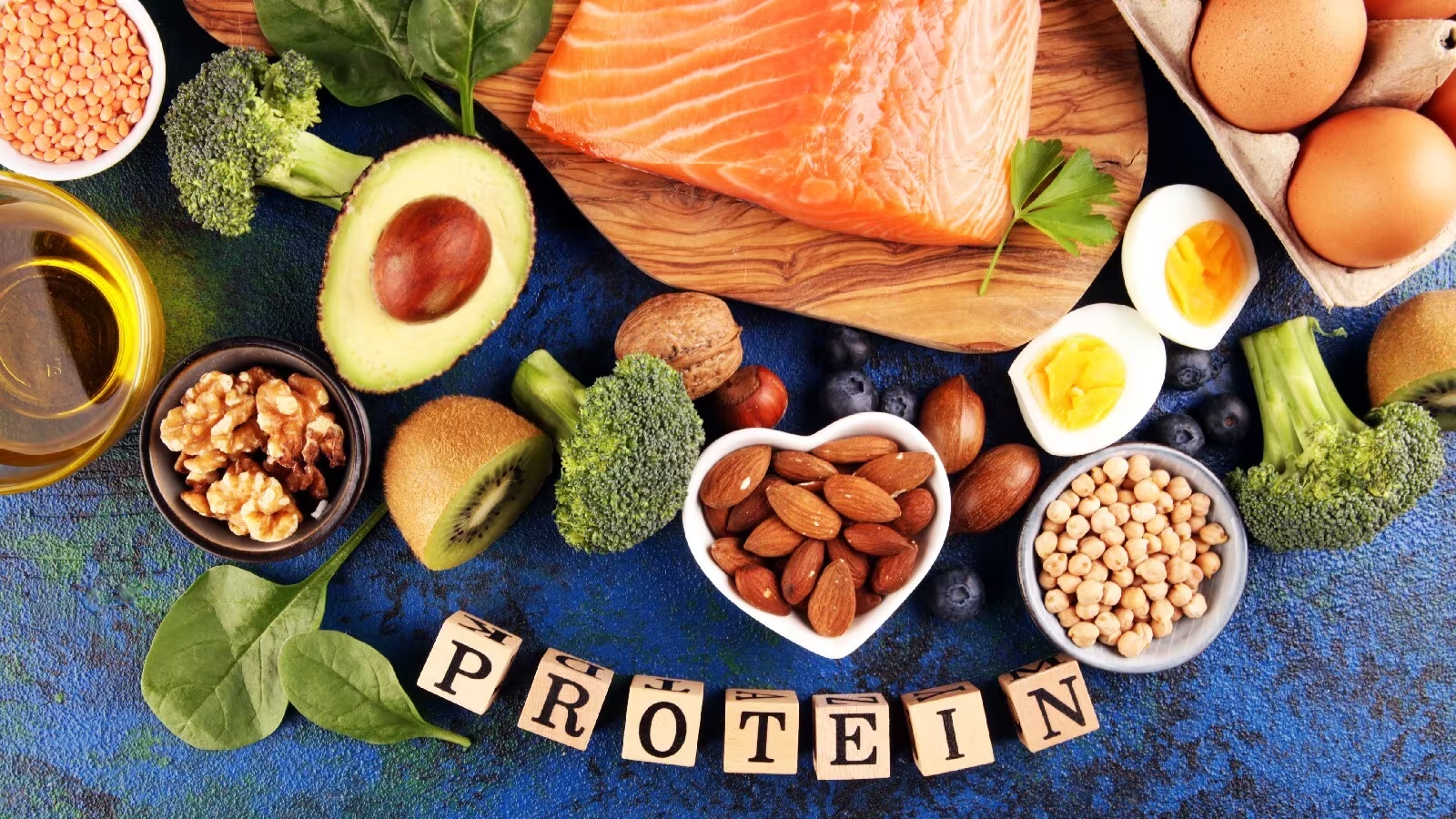All About Proteins-
Proteins are macronutrients that are essential for the growth, repair, and maintenance of tissues in the body. They are made up of smaller units called amino acids, which are linked together in various sequences to form different types of proteins. There are 20 different amino acids that can be combined in different ways to create the wide array of proteins found in our bodies. Good sources of dietary protein include:
- Animal sources: Meat (beef, poultry, pork), fish, seafood, eggs, and dairy products (milk, cheese, yogurt) are rich in protein.
- Plant sources: Legumes (beans, lentils, chickpeas), soy products (tofu, tempeh), nuts, seeds, and whole grains (quinoa, brown rice) provide plant-based protein options.
The recommended daily protein intake varies depending on factors such as age, sex, activity level, and overall health. The average adult requires about 0.8 grams of protein per kilogram of body weight per day. However, athletes and individuals with higher protein needs may require more.It's important to note that a balanced diet should include a variety of nutrient-dense foods from different food groups to ensure an adequate intake of not only protein but also other essential nutrients. If you have specific dietary needs or concerns, it's recommended to consult with a registered dietitian or healthcare professional for personalized guidance.
![]()
Protein Deficiency-
Protein deficiency occurs when a person does not consume enough protein to meet their body's needs. Protein is an essential macronutrient that plays a crucial role in various bodily functions, including building and repairing tissues, producing enzymes and hormones, supporting the immune system, and providing energy.
While protein deficiency is relatively rare in developed countries where food is generally abundant, it can still occur in certain circumstances, such as:
1. Inadequate diet: Not consuming enough protein-rich foods, such as meat, poultry, fish, dairy products, legumes, and certain grains, can lead to protein deficiency. This can happen in cases of extreme calorie restriction, fad diets, or a lack of access to nutritious food.
2. Malabsorption disorders: Certain medical conditions, such as celiac disease, Crohn's disease, or chronic pancreatitis, can impair the absorption of protein and other nutrients from the digestive system, leading to deficiencies.
3. Increased protein requirements: Certain groups of people, such as athletes, pregnant or breastfeeding women, and individuals recovering from surgery or illness, may have higher protein requirements. If their increased needs are not met through diet, they may experience a relative protein deficiency.
The symptoms of protein deficiency can vary depending on the severity and duration of the deficiency. Common signs and symptoms may include:
1. Muscle wasting and weakness: Protein is essential for building and maintaining muscle tissue. Inadequate protein intake can result in muscle loss, weakness, and a decrease in muscle mass.
2. Edema: Protein helps maintain fluid balance in the body. A deficiency can lead to fluid accumulation in the tissues, causing swelling, especially in the legs, feet, and abdomen.
3. Fatigue and low energy levels: Protein is a source of energy, and insufficient protein intake can lead to fatigue, low stamina, and reduced physical performance.
4. Slow wound healing: Protein is necessary for tissue repair. Inadequate protein can delay the healing process and increase the risk of infections.
5. Impaired immune function: Protein plays a vital role in the production of antibodies and immune cells. Protein deficiency can weaken the immune system, making individuals more susceptible to infections.
If you suspect you have a protein deficiency, it's important to consult with a healthcare professional for an accurate diagnosis and appropriate treatment. They can evaluate your diet, perform relevant tests, and provide guidance on how to increase your protein intake through dietary changes or supplementation if necessary.
![]()
Protein Overuse-
While protein is an essential nutrient for the body, consuming excessive amounts of protein can have potential health implications. Here are some considerations regarding protein overuse:
1. Kidney stress: High protein intake can put a strain on the kidneys, as they are responsible for filtering waste products generated during protein metabolism. For individuals with pre-existing kidney conditions, excessive protein intake can worsen their condition. However, there is limited evidence to suggest that high protein intake negatively impacts healthy individuals with normal kidney function.
2. Bone health: Some studies suggest that high protein intake may increase urinary calcium excretion, potentially affecting bone health. However, the relationship between protein intake and bone health is complex, and the impact on bone density and fracture risk is not entirely understood. It is important to note that adequate calcium intake, along with a balanced diet, plays a crucial role in maintaining bone health.
3. Nutrient imbalances: Consuming excessive protein may lead to an imbalance in the intake of other important nutrients. If protein sources are primarily animal-based, it could result in higher intake of saturated fats and cholesterol, while potentially reducing the intake of fiber, vitamins, and minerals found in plant-based foods.
4. Weight gain: Although protein can promote satiety and help with weight management, excessive protein consumption can contribute to weight gain if the overall calorie intake exceeds energy needs. Excess protein can be converted into and stored as fat.
5. Digestive issues: Consuming too much protein, especially in concentrated forms like protein supplements, can cause digestive discomfort, bloating, and constipation in some individuals.
It is worth noting that the recommended dietary allowance (RDA) for protein intake is approximately 0.8 grams of protein per kilogram of body weight per day for the average sedentary adult. However, protein needs may be higher for certain groups, such as athletes, pregnant or breastfeeding women, and individuals recovering from surgery or injury. It is always advisable to maintain a balanced diet that includes a variety of nutrient-dense foods from different food groups, rather than relying excessively on any single nutrient.

